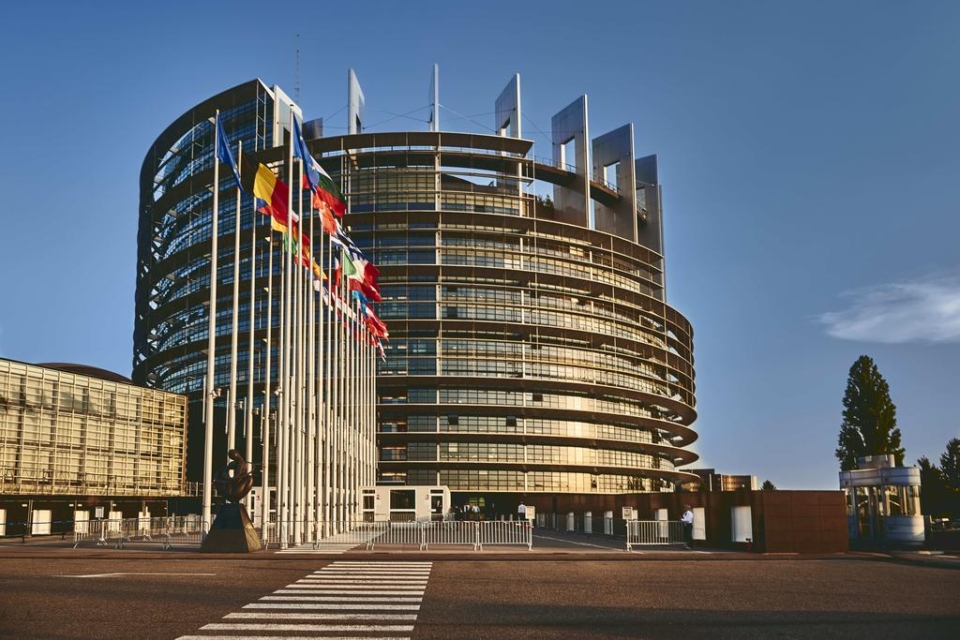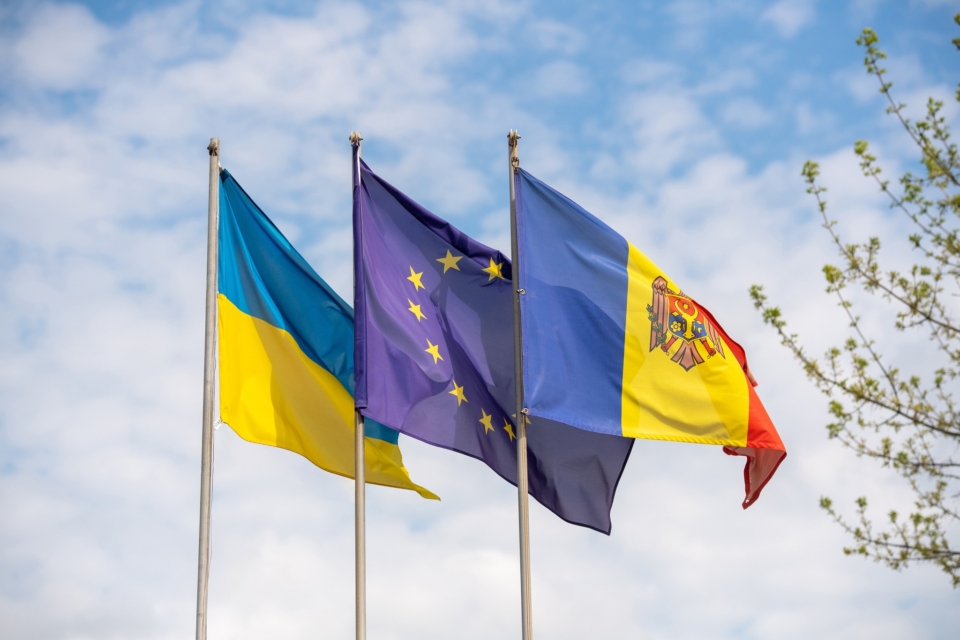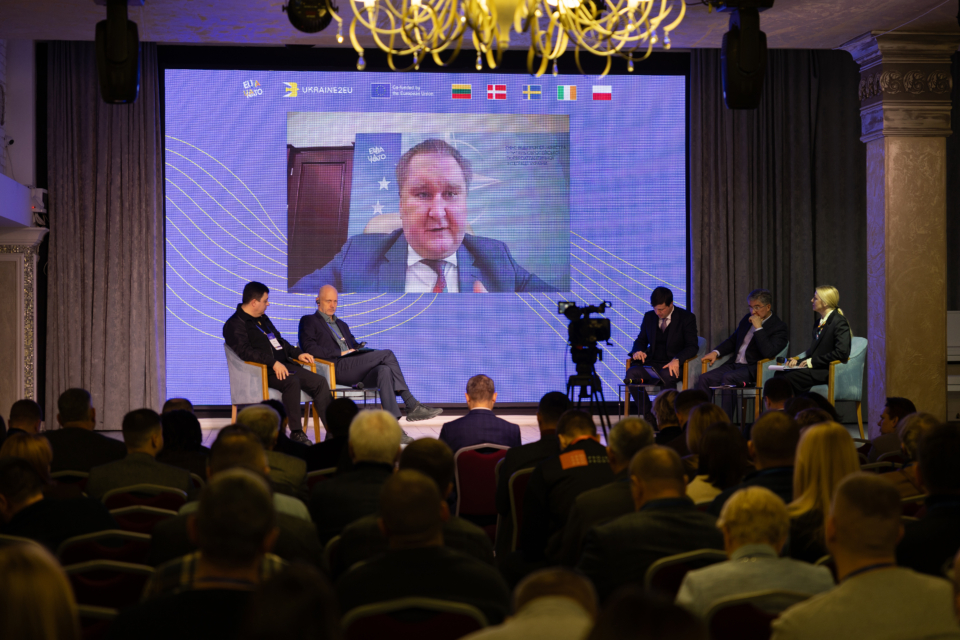Ukraine Strengthens Focus on Regional Readiness for EU Membership
Наш шлях до ЄС
20.11.2025
EU accession is a whole-of-society effort, where central and regional governments work as true partners to prepare the country for membership. Continuous dialogue between these levels isn’t just important – it’s essential for driving coordinated reforms and ensuring successful integration. This is the key message of the Dialogue Session “Regional Readiness for Ukraine’s EU Integration”, held on 20th of November in Kyiv as a satellite event of the EU Enlargement Forum.
The event, organised by the Office of the Deputy Prime Minister for European and Euro-Atlantic Integration, the Government Office for Coordination of European and Euro-Atlantic Integration, with the support of the Ukraine2EU Programme, brought together representatives of the Government, Parliament, regional authorities, as well as high-level advisors and experts from the EU and Ukraine. The participants discussed the ways to translate findings and recommendations of the 2025 EU Enlargement Package into concrete actions across the country and to prepare Ukrainian regions for the opportunities and responsibilities the EU membership brings.
Enlargement Package and Way Forward for Ukraine
Speakers underlined that the European Commission’s 2025 Enlargement Package confirmed once again Ukraine’s sustained progress toward EU membership and recognised systemic reforms being carried out even in the conditions of war.
“In our fourth year of war, Ukraine continues its daily struggle for our people, economy and independence. Yet it is precisely in times of such historic challenges that decisions are made which define the future of our country. Today, we have a unique opportunity to join the European Union, and we must move forward quickly, transparently and responsibly. The reforms we are implementing shape a new quality of governance and lead us toward the EU. Regions and communities play a role equal to that of the central government, as the real change that drives development happens locally. Our regional policy must operate in the European logic of cohesion and create conditions for growth. The Government provides the framework and coordination, but your role in preparing for EU membership is decisive,” – said Taras Kachka, Deputy Prime Minister for European and Euro-Atlantic Integration of Ukraine.
Oleksandr Korniyenko, First Deputy Chairman of the Verkhovna Rada of Ukraine, emphasized: “Parliament is a key institution in aligning national legislation with European standards. This is not about simply translating directives, but about a comprehensive process that requires not only sectoral changes, but deep reforms. Our shared success also depends on the capacity of regional authorities and communities, because European integration is equally about changes at the local level – ensuring that European standards are applied consistently across all of Ukraine”.
Stefan Schleuning, Head of Cooperation at the Delegation of the European Union to Ukraine underlined the EU’s continued commitment to supporting Ukraine on its path to EU membership: “Ukraine is strongly committed to its EU accession path. This is recognized in our 2025 Enlargement Package which shows steady progress since the first report in 2023 and includes recommendations for priority reforms for the coming year, including in the area of rule of law and the fight against corruption. The European Union will continue to support Ukraine every step of the way towards EU membership. Together, we are building our common European future.”
Regions at the Heart of EU Accession
Given that around 70% of the EU acquis is implemented at the regional and local level, Ukraine’s regions are not only beneficiaries of reforms, but also strategic partners and actors in the country’s EU accession process. Strengthening their capacity to apply and monitor European standards is therefore key to ensuring that the EU integration brings real benefits for citizens.
Regional administrations already demonstrate dedicated leadership in the European integration process, which makes their role increasingly important. Deputy Heads of Regional Military Administrations for EU integration are coordinating accession-related reforms on the ground, establishing the links between local development priorities and national objectives, engaging communities, and preparing for the future management of the EU cohesion, regional, and rural development funds.
Participants highlighted regional perspectives on how local administrations contribute to European integration efforts and prepare to apply EU standards in practice.
Pavlo Zhurba, Deputy Head of the Ternopil Regional Military Administration for European Integration, underlined the growing role of regional administrations: “European integration is not only about the national level – it is about every region, every community and every person. Regional state administrations act as ambassadors of EU-integration processes across the regions: our task is to prepare communities for upcoming changes, help them understand new rules, and support them in implementing European standards. Only through joint efforts can we create the conditions for sustainable regional development within European space.”
Background Note
The Dialogue Session “Regional Readiness for Ukraine’s EU Integration” was organised by the Office of the Deputy Prime Minister for European and Euro-Atlantic Integration of Ukraine, the Government Office for Coordination of European and Euro-Atlantic Integration, in cooperation with the Ukraine2EU Programme (EU Integration Support Programme for Ukraine), in partnership with the Agency for Legislative Initiatives.
The Dialogue Session was held as a satellite event of the EU Enlargement Forum in Brussels on November 18, 2025, – the European Commission’s key platform to bring institutions, citizens, and candidate countries together to discuss the future of Europe.
The Ukraine2EU Programme is a flagship initiative of the European Union designed to assist Ukraine in successfully completing its EU accession process and preparing for EU membership. It is implemented by the Lithuanian Central Project Management Agency (CPVA) and co-financed by the European Commission, Denmark, Lithuania, and Sweden.
For media inquiries: press@ukraine2eu.eu
Other news
All news













